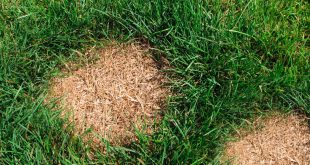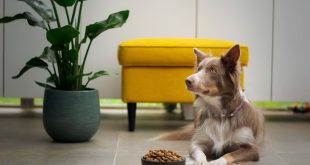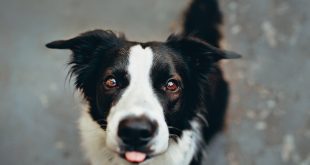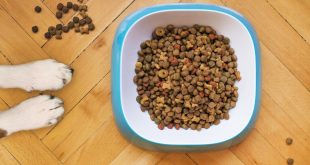This post may contain affiliate links. Please read our disclosure.
Are you tired of your dog eating their own poop? It’s a common problem for pet owners, but there is an easy solution! By adding certain ingredients to your pup’s food, you can help them stop this unpleasant behavior. This guide will provide everything you need to know about what to put in dog food to stop eating poop. With the right knowledge and some patience, you’ll soon have a happier and healthier pup. Let’s get started!
Article Contents
Benefits of Including Nutrients in Dog Food
Feeding your dog a high-quality diet with the right balance of nutrients is essential for its health and wellbeing. Nutrients play an important role in providing energy, building strong bones, maintaining healthy skin and fur, as well as promoting overall physical development. Here are some of the main benefits associated with including key vitamins and minerals in your pet’s food:
Promotes Optimal Growth & Development: Nutrients help support your pup’s growth and development throughout their life cycle by providing essential proteins, fatty acids, carbohydrates and other vital components to ensure optimal body function. They also help build strong muscles, which can improve performance during exercise or agility training.
Supports Immune System Health: Dogs need certain vitamins such as Vitamin A and E to maintain a healthy immune system that keeps them safe from illnesses like parvovirus or distemper. Minerals like zinc are also necessary for proper functioning of lymphatic cells responsible for fighting off infections while antioxidants protect against oxidative damage caused by free radicals in the environment. Additionally, these nutrients can help promote better digestion so they absorb more nutrition from their food than if it was lacking any beneficial ingredients.
Maintains Healthy Skin & Coat: Certain vitamins play an important role in keeping your pup’s coat shiny and smooth while promoting healthy skin too! Fatty acids such omega 3 & 6 in dog food provide moisture to keep skin supple while Vitamin B complex helps combat dryness due to environmental stressors like wind or cold weather conditions outside. Additionally, antioxidants found in many fruits vegetables can reduce inflammation which can aid with itchiness often seen dogs suffering from allergies or sensitivities related issues
Understanding the Reasons Dogs Eat Poop
Most people find it off-putting and downright gross when their pet pooch takes to munching on poop. It’s not only an unpleasant habit, but can be dangerous too; so why do dogs eat poop? Understanding the underlying reasons for the behavior is important in order to help put a stop to it.
One of the main causes behind this nasty snack choice stems from a nutritional deficiency. If your pup isn’t getting all the necessary vitamins and minerals they need from their diet, they may turn to alternative sources – like feces – in an attempt to make up for what’s lacking in their meals. Other potential causes include stress, boredom or even simply copying another dog’s bad habits – if one canine sees another eating poop, there’s often no stopping them once given the chance!
Other times dogs will eat fecal matter out of instinct rather than any real physical desire or need. In some breeds it has been observed that mothers will consume their own puppy’s waste as part of a natural cleaning process – usually done to keep unwanted attention away from her young pups by removing traces of scent detectable by predators. Some adult dogs have also been known to indulge in this instinctual behavior occasionally as well.
Finally, sometimes medical issues can be at play such as parasites which produce cravings for substances present within stools (such as undigested food particles) or pancreatic insufficiency which leads pets to eat strange things including excrement due its high fat content compared with other foods available elsewhere around them.
What to Put in Dog Food to Stop Eating Poop
No pet parent wants to deal with their pup eating poop – it’s gross and can be dangerous for them! Fortunately, there are steps you can take to stop Fido from indulging in this nasty habit. It all starts with feeding your dog a balanced diet that will give him the nutrients he needs without resorting to pooping.
When choosing the right food for your pup, make sure that it is high in protein and fiber. Protein helps promote healthy digestion, which decreases the chances of Fido wanting to eat his own stool or those of other animals. Fiber is also important as it helps keep your pup regular and ensures they feel full throughout the day – reducing cravings for non-food items like poop! Additionally, adding probiotics into your dog’s daily routine may help reduce their urge to munch on feces since these beneficial bacteria aid in digestion and gut health.
In addition to adding more beneficial ingredients into their food bowl, consider switching up meal times if possible. Spreading out meals over several smaller portions throughout the day instead of one large meal can help prevent hunger pangs that could lead them down an unpleasant path – such as sampling someone else’s waste! Lastly, always ensure that you’re providing enough physical activity for your pup each day – exercise not only keeps them happy but also gives them something better than poo snacks to focus on!
Factors to Consider When Choosing a Diet for Your Dog
When it comes to our four-legged companions, the food we provide can play a major role in their wellbeing. After all, many of us would never dream of settling for subpar nutrition ourselves – so why should our canine family members settle? It is important that when considering your pup’s diet, you take into account several factors that will ensure they are receiving the best nutrition possible.
The age and breed of your dog must be taken into consideration when selecting a diet. Different ages have different nutritional requirements as do different breeds or sizes; puppies need more energy than older dogs, while large-breed pups may require specific types of proteins and fats due to their being more susceptible to joint issues later in life. Discussing these needs with your vet will help you determine what kind of food is most suitable for your pal.
It is also essential to pay attention to quality ingredients such as high-quality proteins like chicken or salmon and fiber sources like pumpkin – both excellent sources of nutrients for pups! You’ll want something without any filler ingredients such as corn, wheat or soy which may be difficult for some dogs to digest properly leading them digestive distress or allergies over time if fed regularly. Additionally look out for artificial flavors preservatives coloring agents which can potentially cause health problems down the line if given on an ongoing basis. Lastly check out reviews from other pet parents who have used the same product before making purchase decisions – this way you’ll get first hand feedback on how well a particular brand works with various pets!
Common Ingredients and Their Effects on Eating Habits in Dogs
When it comes to the food that dogs eat, there are a few common ingredients that can have an influence on their eating habits. Knowing what these ingredients are and how they affect dogs is important for making sure your furry friend stays healthy and happy.
For starters, carbohydrates are one of the most popular dietary components for dog foods. They provide energy and help keep them feeling full longer. Most commonly used carbs in dog foods include rice, oats, barley, tapioca starch and potatoes. All of these offer high-quality nutrition without adding too much fat or sugar to their diet which is beneficial for maintaining good health overall.
Protein is another key ingredient when it comes to canine diets as it helps with muscle development as well as providing essential vitamins and minerals needed for optimal growth and development. The most common sources of protein found in petfoods include chicken meal, beef meal, lamb meal fishmeal among others. These proteins can also help reduce inflammation caused by allergies or sensitivities which can be beneficial if your pooch has any special needs in this area.
Fatty acids are also commonly included in many petfoods as they provide essential fatty acids such as omega 3’s which help maintain joint health while keeping skin looking shiny and healthy at the same time! Sources like salmon oil or flaxseed oils contain some of the highest concentrations of these essential fatty acids so if you want to ensure your pup gets all benefits from his meals then make sure you look out for them when checking labels!
Fiber is another vital component when it comes to keeping digestive systems working properly – insoluble fibers like beet pulp help move waste through intestines more efficiently while soluble fibers like pumpkin work great at slowing down digestion so nutrients get absorbed better over time! Not only do fiber rich foods keep our furry friends regular but they’re also helpful at controlling weight gain since fiber takes up space without adding calories – perfect option if you’re concerned about your pup putting on extra pounds too quickly!
Overall understanding what goes into our pups’ food will give us insight into what we need to look out for when shopping around – whether its avoiding certain ingredients due allergies/intolerances or simply wanting best quality nutrition available so our four-legged companions stay fit & strong no matter how old they may be!
Formulas That Work Best for Stopping Coprophagia in Dogs
When it comes to stopping coprophagia in dogs, there are a few effective formulas that can help. Coprophagia is the scientific term for when animals, particularly dogs, eat their own stool or that of other animals. While this behavior may be normal in some cases, it can also signal underlying issues such as malnutrition and anxiety. To address this problem and keep your pet healthy and happy, these are some of the most successful techniques:
First of all, proper nutrition is essential for curbing coprophagia in dogs. Make sure you’re giving them high-quality food with balanced nutrients like protein, fiber, vitamins and minerals – this will give them everything they need to stay full throughout the day. Additionally consider adding supplements such as probiotics or digestive enzymes which can improve digestion and reduce the urge to snack on feces.
Another technique often used by dog owners is changing up your pup’s environment so they don’t get bored or anxious enough to resort back to eating poop as a form of gratification. Ensure that your pooch has plenty of activities/toys available at all times; regular walks/exercise; adequate mental stimulation through games/training sessions; access to socialization opportunities (other pets or people); and an appropriate amount of attention from you every day! Finally if none of these approaches seem successful then consulting a vet about potential medical causes could be beneficial too – sometimes gastrointestinal disorders contribute significantly towards coprophagia behaviors so getting professional advice would be wise here!
Making Your Own Balanced Dog Food Recipe
Creating a balanced dog food recipe can be an exciting and rewarding experience. With the right ingredients, you can make sure your furry friend is getting all of the nutritional goodness they need to stay healthy and happy. Here are some steps to get you started on making your own delicious recipe for Fido:
First, consider what type of proteins will best suit your pup’s needs. Different types of protein have different levels of essential nutrients required by dogs for optimal health. Look for lean meats such as chicken, turkey or duck that provide high-quality proteins in addition to other important vitamins and minerals. If possible, opt for organic sources since these tend to be higher quality than conventional sources. You may also want to add in fish oil or plant-based protein such as lentils or quinoa if your pup requires more variety in their diet than just meat alone!
Second, determine how much fat content is needed in the recipe based on age and activity level of the dog being fed. Generally speaking adult dogs require about 6% – 8% fat content while puppies require around 10%. High quality fats like salmon oil are excellent choices because they offer beneficial omega-3 fatty acids which help with cognitive development and joint health among other things! Additionally try adding fresh vegetables into the mix; cooked sweet potatoes are an excellent source of complex carbohydrates while carrots contain antioxidants which support immune system function.
Finally when it comes time to cook up a batch make sure you follow proper hygiene practices like washing hands thoroughly before handling any raw ingredients (especially meat) and always cooking food at recommended temperatures according to safety guidelines set out by veterinarians so that bacteria isn’t spread throughout the kitchen area!
Before transitioning to the new dog food, make sure you follow our guide on how to transition dog food.
Wrap up!
In conclusion, when considering a diet for your dog, it is important to take into account their specific needs and nutritional requirements. Including certain essential nutrients in the food can help prevent coprophagia or eating poop. Different ingredients have different effects on dogs’ eating habits so be sure to research what would work best for your pup before making any changes. If you decide to make your own dog food recipe, there are potential risks that need to be taken into consideration first. Ultimately, providing your pup with a balanced meal will ensure they get all the necessary nutrition while avoiding any unwanted behaviors like coprophagia.
FAQ on Dogs Eating Poop
What to put in dog food to stop it from eating poop?
Adding fiber to your pup’s diet can help reduce the urge to eat their own poop. High-fiber foods like pumpkin, sweet potatoes, or green beans are all good options.
How do I stop my dog from eating poop?
There are several preventative steps you can take such as providing them with regular exercise and mental stimulation, ensuring they always have access to fresh water and a balanced diet, and making sure their living environment is clean. Additionally, adding fiber to their meals may help reduce the urge for them to consume feces.
What should I feed my dog if they refuse kibble?
If your pup isn’t interested in dry food then try switching it up by offering moistened kibble or wet canned food as an alternative option. You could also add flavor enhancers such as broth or plain yogurt which will make the meal more appealing and tasty for them!
How often should I give my dog treats?
Treats shouldn’t exceed 10% of your pet’s daily caloric intake so based on that recommendation it’s best not to give too many snacks throughout the day but instead opt for one treat per day (or every other day). Always make sure that whatever treats you’re giving meet nutritional requirements set out by AAFCO standards!
What supplements should be added into a dogs diet to stop it from eating poop?
Depending on your pup’s age and health condition there might be certain supplements recommended by your veterinarian such as omega-3 fatty acids for joint support or glucosamine/chondroitin for improved mobility. Adding probiotics might also provide digestive benefits while antioxidants could improve immune system functioning – just be sure check with a professional before administering any new dietary supplement!
 Petnile Comprehensive Pet Care Guides
Petnile Comprehensive Pet Care Guides



